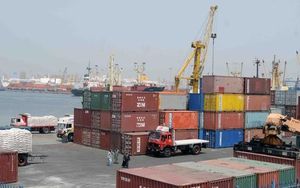Allegations of sexual assault against the late Mohamed Al Fayed, former owner of Harrods, have surged following the recent airing of a BBC documentary investigating his alleged crimes. Over 200 accusations, including rape and sexual assault, have emerged as women feel increasingly empowered to share their stories.
According to the Metropolitan Police, they are currently investigating 40 new allegations linked to Al Fayed, as reported on Thursday. These latest claims come on the heels of allegations made by 65 women who responded to the documentary aired last month. The police have stated they will continue their investigations, acknowledging the need to remain sensitive to the claims from these victims.
The origins of the newest allegations date back to as early as 1977, indicating the extent of Al Fayed’s alleged predatory behavior and raising questions about the handling of such allegations during his lifetime. The accusations span from 1979 to as recently as 2013, and they also extend beyond the confines of his well-known business at Harrods. This broadening of the inquiry reflects not only on Al Fayed’s conduct but also brings to light the possible complicity of others within his sphere of influence.
Al Fayed, who passed away last year at the age of 94, built his fortune through business ventures, particularly the luxury department store Harrods, which he owned from 1985 until its sale in 2010. The cloud of disturbing allegations has loomed over his legacy, with many now questioning what those years of ownership meant for the numerous women who reportedly suffered at his hands.
The BBC documentary "Al-Fayed: Predator at Harrods" delves deep, presenting first-hand testimony from women who claim they were either sexually assaulted or raped by Al Fayed during their employment at the iconic department store. Reports indicate Harrods, under Al Fayed's direction, did not just neglect these allegations — there are hints it may have actively tried to cover up the abusive nature of his behavior.
Following the release of the documentary, Harrods has publicly expressed its regrets and has pledged to work closely with those coming forward. The current management at Harrods has stated it is "deeply sorry" for the failings of its past when it came to the treatment of its employees. They are reported to be engaging with over 200 individuals who are now pursuing claims associated with their experiences during Al Fayed's tenure. Harrods is also conducting its own independent review, initiated back in 2023, to confront historical injustices.
A spokesman for Justice for Harrods Survivors, which consists of barristers advocating for the victims, shared insights about the rising number of women who are now feeling secure enough to voice their experiences. The group has reported retaining 71 clients and processing inquiries from over 220 women, indicating the significant scale of the issue.
Commander Stephen Clayman of the Metropolitan Police has emphasized the importance of these new reports, which have resulted from the appeal made following the documentary's airing. Notably, he acknowledged the courage it takes for survivors to come forward. "All these reports will need to be formally logged and assessed to see if there are any allegations of criminality to pursue. This will take time, but I can assure those who have contacted us, we will keep them updated with our progress," Clayman stated.
Regarding past investigations, these claims add to 21 known allegations against Al Fayed previously recorded by the police, stretching from 2005 up until his death. Out of these earlier reports, four involved allegations of rape, 16 were classified as sexual assault, and one involved trafficking. Despite repeated inquiries over the years, the Crown Prosecution Service found no grounds to take actionable steps against Al Fayed — a reality now seen through the lens of growing public scrutiny and dissatisfaction.
With the current investigations, the Metropolitan Police are not just focusing on Al Fayed but are also contemplating potential actions against others who may have facilitated or covered up his alleged offenses. This pivot reflects the systemic issues surrounding the culture of silence and complicity within powerful establishments.
Many observers have expressed astonishment at the apparent inability to charge someone as prominent as Al Fayed, especially when accusations have now reached the number of over 200 provided by various victims. Public and legal inquiries will likely come to address how such significant allegations were historically managed in both the business and legal realms.
Testimonies gathered by the BBC have particularly pointed to the tactics Al Fayed allegedly employed to exploit women both within and outside his businesses. Stories have emerged of women being recruited under false pretenses and finding themselves subjected to unwanted advances and, even worse, outright assaults at his properties, including his mansion located in Oxted.
For many advocates, the challenge remains not only to seek justice for the harmed women but also to initiate broader conversations about accountability within industries where power dynamics often silence victims. With the increasing willingness of survivors to speak out, the momentum appears to be shifting, igniting discussions about protective measures for victims and legal accountability.
The fallout from these disturbing revelations will likely reshape perspectives on sexual assault allegations and how they are handled, brightly illuminating the plight of countless women who have suffered behind the façade of respectability portrayed by those at the top echelons of society. The story of Mohamed Al Fayed serves as both a cautionary tale of unchecked power and as inspiration for those advocating lasting change for survivors of abuse.



